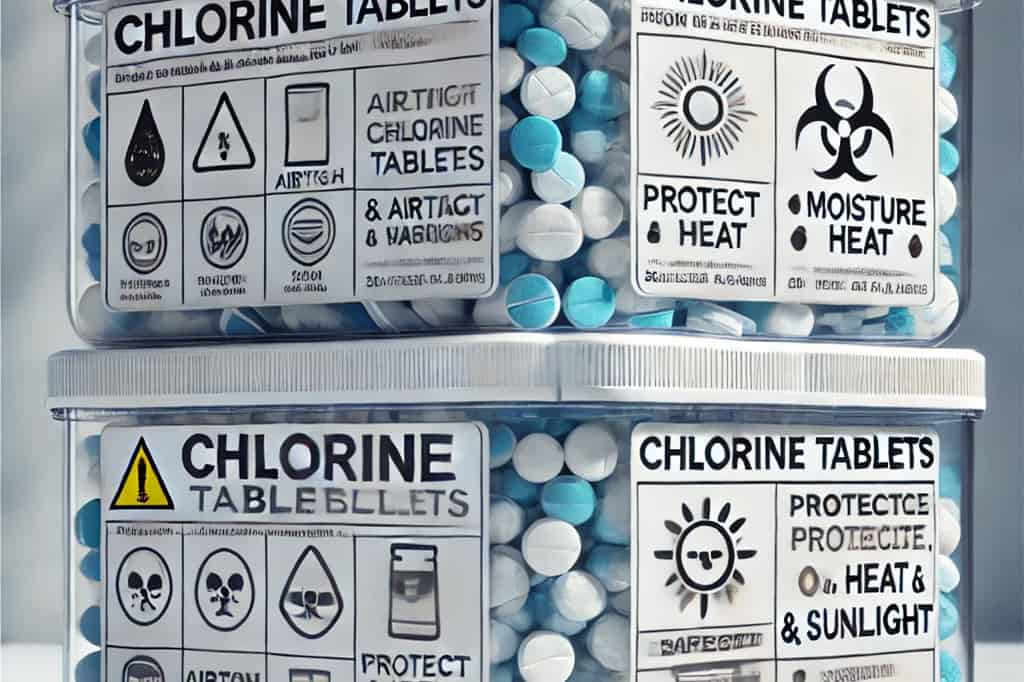Chlorine tablets are essential for maintaining clean and safe water in swimming pools, as they help eliminate harmful bacteria, algae, and other contaminants. Given their critical role in water sanitation, ensuring the quality of chlorine tablets during manufacturing is vital. The effectiveness and longevity of chlorine tablets depend heavily on how they are produced, which means both manufacturers and consumers need to pay close attention to the processes and standards involved.

Manufacturing Process and Standards
For chlorine tablets manufacturer to produce high-quality tablets, the manufacturing process must be carefully controlled and adhere to strict guidelines. This begins with sourcing the right raw materials. Typically, chlorine tablets are made from trichloroisocyanuric acid (TCCA), a chemical compound that is highly effective in water disinfection. The purity and consistency of this compound directly affect the tablet’s ability to dissolve uniformly and maintain a stable release of chlorine over time.
In addition to selecting high-quality raw materials, the production environment must meet regulatory standards for cleanliness, safety, and efficiency. This includes ensuring that machinery is properly maintained and that all workers follow hygiene and safety protocols. A clean production line helps prevent contamination, which could otherwise reduce the effectiveness of the chlorine tablets.
Adherence to Good Manufacturing Practices (GMP) is critical for any chlorine tablets manufacturer. GMP guidelines ensure that products are consistently produced and controlled according to quality standards, minimizing the risk of contamination, mix-ups, and errors. It’s essential for manufacturers to conduct regular audits of their processes and facilities to ensure they meet these standards.
Tablet Consistency and Dissolution Rate
One of the key factors in the quality of chlorine tablets is their consistency in size and weight. Tablets that are inconsistent may dissolve at different rates, leading to unpredictable chlorine levels in the pool. If chlorine levels are too low, the pool will not be properly sanitized, leading to the growth of harmful bacteria and algae. On the other hand, if the chlorine level is too high, it can cause skin irritation, eye discomfort, and a strong chlorine odor.
High-quality chlorine tablets should dissolve slowly and steadily over time, ensuring a consistent release of chlorine into the pool water. This slow dissolution helps maintain the correct chlorine levels without the need for frequent adjustments. Tablets that dissolve too quickly may lead to wasted chlorine and the need for constant replenishment.
Manufacturers achieve this consistent dissolution rate by carefully controlling the compression process during tablet formation. The pressure applied when forming the tablet can affect its density, which in turn influences how quickly it dissolves in water. Chlorine tablets manufacturer must regularly test their products to ensure they meet the required dissolution rates, thus providing pool owners with reliable and effective sanitation.
Packaging and Storage
Proper packaging plays a crucial role in maintaining the quality of chlorine tablets. Because chlorine is a reactive chemical, it can degrade when exposed to moisture, heat, or sunlight. High-quality packaging materials, such as airtight plastic containers, help protect the tablets from environmental factors that could reduce their effectiveness.
Chlorine tablets should always be stored in a cool, dry place, away from direct sunlight and moisture. Chlorine tablets manufacturer should clearly indicate these storage requirements on their product packaging to help consumers maintain the product’s quality until it is used.
In addition, packaging should include clear labeling with instructions for proper usage, safety warnings, and a list of active ingredients. This ensures that consumers are well-informed about the product they are using and can apply it correctly in their pools to achieve the best results.
Regulatory Compliance
In many countries, chlorine tablets must meet specific regulatory standards to be sold to consumers. For example, in the United States, chlorine products are regulated by the Environmental Protection Agency (EPA), which sets guidelines on the proper handling, usage, and labeling of chemical disinfectants. Chlorine tablets manufacturer are required to register their products with the EPA and comply with these guidelines to ensure they are safe for consumer use.
Additionally, manufacturers must ensure that their products comply with safety and environmental regulations. This includes proper disposal of chemical waste during the manufacturing process and ensuring that the finished product is safe for the environment when used in pools.
Assessing Product Quality as a Consumer
As a pool owner, it’s important to be aware of the quality of the chlorine tablets you are using. One of the first things to look at is the reputation of the chlorine tablets manufacturer. Well-established manufacturers are more likely to follow strict quality control practices and adhere to regulatory standards. Reading product reviews and looking for EPA registration numbers on packaging can help ensure you’re purchasing a high-quality product.
Price is another factor that consumers often consider when purchasing chlorine tablets. While it’s tempting to opt for cheaper alternatives, it’s important to note that lower chlorine tablets prices may reflect compromises in quality. Cheaper tablets may dissolve too quickly, leading to inconsistent chlorine levels and increased usage, which can end up costing more in the long run. On the other hand, higher chlorine tablets prices often indicate that the manufacturer has invested in superior raw materials, better manufacturing processes, and more rigorous quality control.
When evaluating chlorine tablets prices, it’s important to strike a balance between affordability and quality. Paying a bit more for a reliable product ensures consistent pool sanitation, better water quality, and less frequent tablet replacements.
Conclusion
Ensuring the quality of chlorine tablets during manufacturing is critical for pool safety and sanitation. From selecting high-grade raw materials to following strict manufacturing standards, every step of the process contributes to the effectiveness of the final product. Consumers should be mindful of the reputation of the chlorine tablets manufacturer and the factors that influence chlorine tablets prices to make informed purchasing decisions. By choosing high-quality chlorine tablets, pool owners can maintain clean, safe water while optimizing the performance and longevity of their investment.
